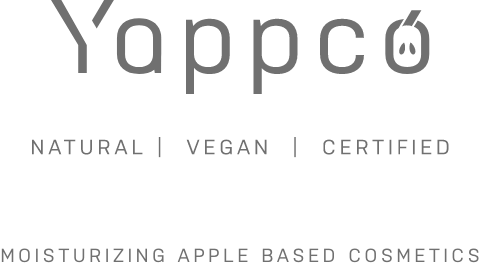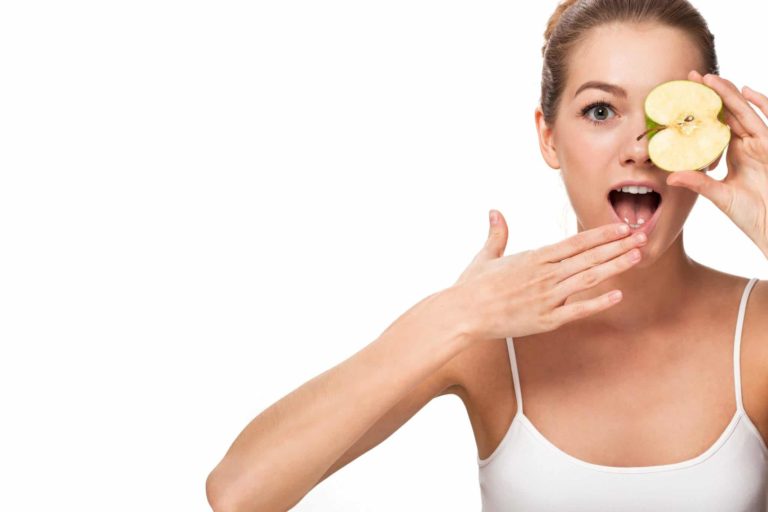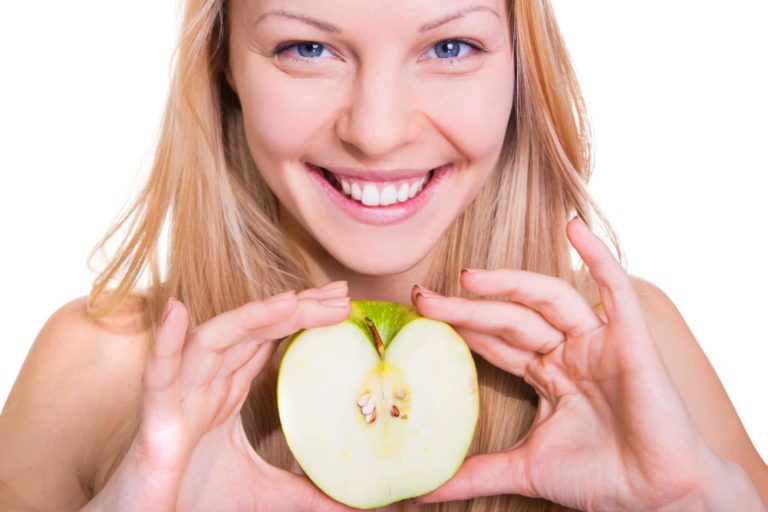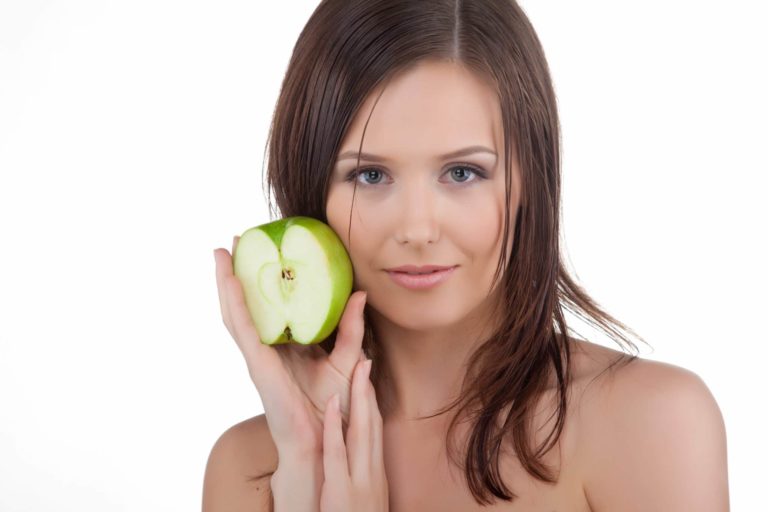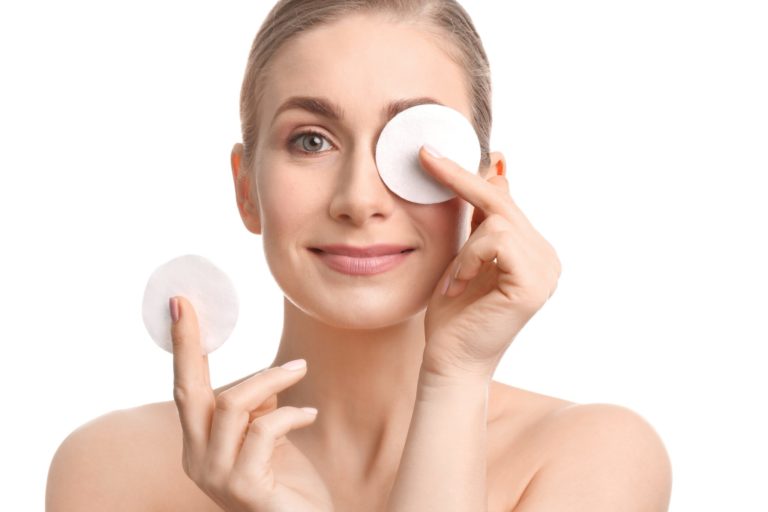
Through the stomach to beauty
Basic information about what an apple hides, not only for the sake of beauty.
Polish apple is known all over the world for its many valuable properties – especially a large amount of vitamins and minerals, which are found in this low-calorie fruit. Thanks to them not only can we take care of our health and figure, but also preserve young and beautiful skin. Apples are full of compounds, which are extremely beneficial to our health and beauty. So what exactly can apples offer to us? Here is the list of vitamins, minerals and other important substances, which positively affect our body, and therefore also enhance beauty.
Water – contrary to other fruit, e.g. bananas, apples contain a considerable amount of water - over 85 grams of water per 100 grams of fruit. Thanks to this, they are able to provide extra hydration, which obviously leads to improving skin condition and all processes taking place in the body.
Calories and macronutrients – it can be easily said that an apple is a low-calorie fruit, which provides few, because only 54 kilocalories per every 100 grams.
It means eating foods whose digestion and absorption by the body consume more energy than the foods provide. What is more, apples make us feel satiated, so after eating them we refrain from reaching for another snack.
It has a low glycemic index and even though the amount of carbohydrates and sugars in relation to protein (11,8 g of carbohydrates, almost 8 grams of sugar per 100 grams, with 0,3 grams of protein) is quite high, it is still a very dietary fruit thanks to valuable fibre (up to 2,3/100 g). Fibre slows digestion, causing a feeling of satiety (fullness). According to the research, eating more foods rich in fibre, such as apples, is associated with less weight gain over time.
Apples are a super-fruit rich in microelements, vitamins, acids and polyphenols that are beneficial for our beauty.

Apple, and vitamins and minerals that affect the preservation of beautiful skin.
Apples are rich in numerous substances that positively influence our skin, and this is the reason why it is worth eating them raw, but also in a form of dietary supplements, whose ingredients are selected to meet the needs of different skin types. They can enhance even the most effective products, such as natural anti-wrinkle creams, or extend the stages of natural care. Extracted from the pulp vitamins A, C, E, B1, B3, B5, B6, B9, B12 significantly contribute to improving the functioning of the processes which occur in the skin.
Vitamin C is a strong antioxidant, which reduces the harmful effect of free radicals on skin cells caused by pollution or too much sun exposure. When it is consumed with foods rich in vitamin E, which can be also found in apples, vitamin C perfectly protects skin from excessive sun rays. Vitamin C is a cofactor for both lysyl and prolyl hydroxylase, which stabilize the production of collagen, i.e. it makes an excellent support for this compound. It also plays an important role in cholesterol synthesis, iron absorption, it increases the bioavailability of selenium and thus it also has a rejuvenating effect on our organs. The most commonly described skin symptoms associated with vitamin C deficiency are attributed to impaired collagen synthesis, which affects the young appearance of our skin. Apples also contain significant amounts of skin-brightening vitamin A in the form of retinoids, which contribute to maintaining healthy skin and reducing the risk of skin cancer. One apple makes as much as five percent of a woman’s daily need for vitamin A. β-carotene (beta-carotene) found in the apple skin supports vitamins C, E and A in the protection against harmful sun radiation, gives the skin a delicate colour and improves the processes of its healthy tanning, just like many natural body lotions. β-carotene is the most important one among the carotenoids, natural pigments, which can be found in the human diet. Compared to other carotenoids, the primary role of β-carotene is its activity with vitamin A. Beta-carotene can be cleaved by the BCMO1 enzyme into two molecules of all-trans retinol, which also contributes to maintaining young skin. In addition, β-carotene can also act as a substance against lipid free radicals and as an oxygen regulator in cells, as it was demonstrated in the in vitro research., that is, it supports this relationship perfectly. It also plays a role in cholesterol synthesis, iron absorption and increases the bioavailability of selenium, which also has a rejuvenating effect on our organs. The most frequently described skin symptoms associated with vitamin C deficiency are attributed to impaired collagen synthesis, which affects the youthful appearance of our skin. Apples also contain significant amounts of skin-brightening vitamin A in the form of retinoids, which help build healthy skin and reduce the risk of skin cancer. One apple can provide as much as five percent of a woman's daily requirement for vitamin A. β-Carotene (beta-carotene) found in the peel supports the action of vitamins C, E and A in protecting against harmful radiation and gives the skin a delicate color, improves its healthy processes tanning like many natural body lotions. β-carotene is the most important member of the group of carotenoids, natural pigments that can be found in the human diet. Compared to other carotenoids, the primary role of β-carotene is its activity with vitamin A. Beta-carotene can be split by the BCMO1 enzyme into 2 molecules in total trans-retinol, which also affects the preservation of youthful skin. In addition, β-carotene can also act as a substance that counteracts lipid free radicals and as a regulator of oxygen in cells, as demonstrated in an in vitro study.
It is also important to pay attention to the minerals contained in apples, such as iron, zinc, silicon or selenium (better absorbed thanks to vitamin C), whose deficiencies in the body can lead to anemia, greying of the skin and dark circles under eyes. These minerals strengthen blood vessels, just like rutin, which is extremely beneficial in the protection of vascular skin.
Compounds which are less known, though very good for skin.
However, apples are not only vitamins and minerals, but also flavonoids, such as phlorizin, apigenin, silymarin and genistein. Phlorizin has been extensively tested for anti-aging effects on the skin. Apigenin, genistein and other polyphenols protect skin from the sun and inflammation caused by UV radiation, as well as skin discoloration. They also control sebum secretion, thus can help in the treatment of acne. One glass of raw apple slices (with peel) contains about 5 mg of vitamin C. As we have mentioned before, this vitamin rejuvenates the skin thanks to its antioxidant effect. Therefore, topical and oral use of apples rich in vitamin C moisturizes skin and can even prevent skin cancer.
Of course, apples have a lot more properties beneficial to our skin, and their consumption, as well as use in dietary supplements, will always be a good solution, regardless of our skin type. Fortunately, they are our national, easily accessible low-price fruit – thanks to this, each of us can get the best of them.
